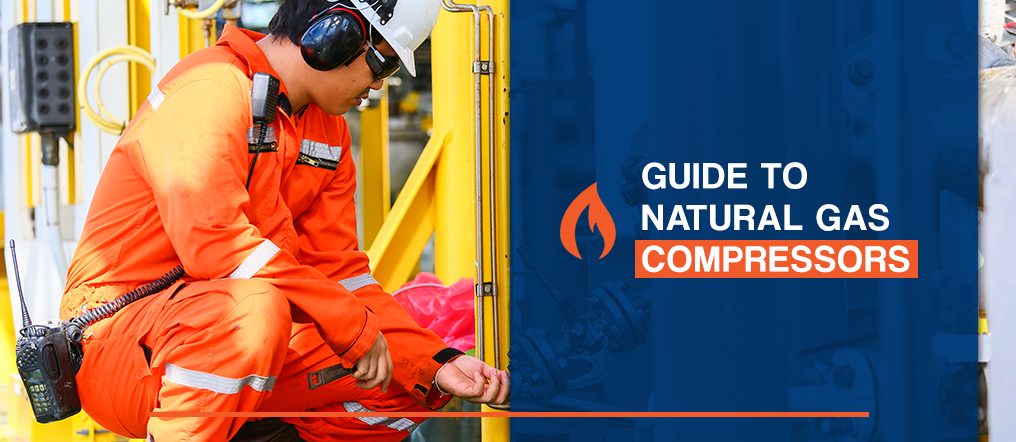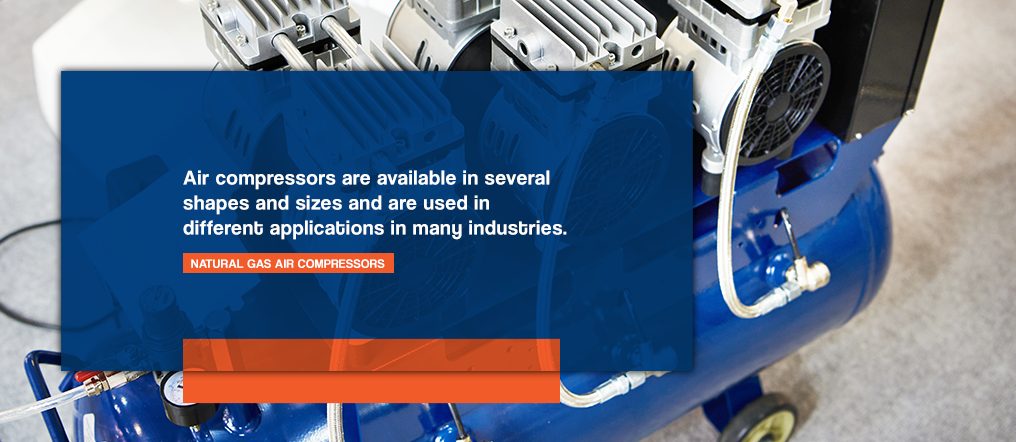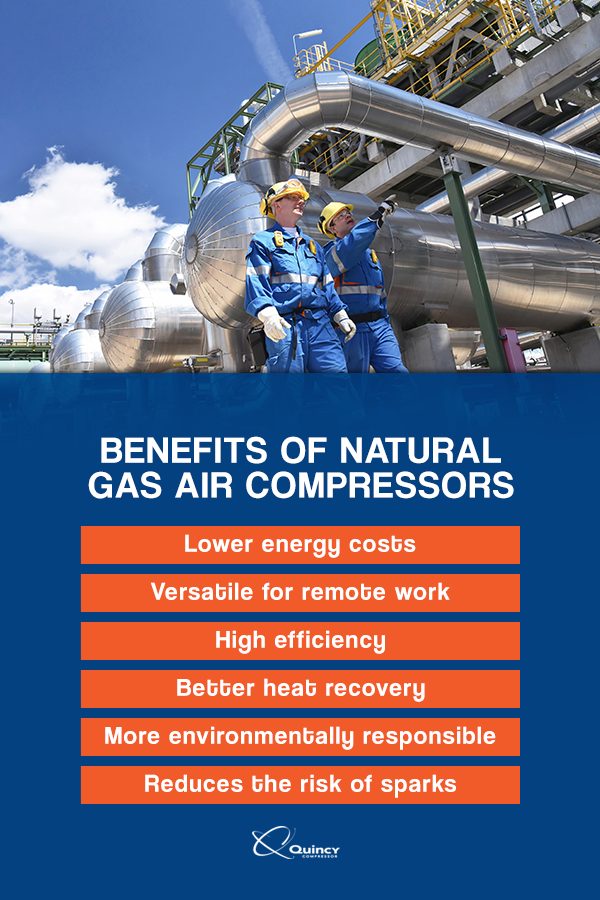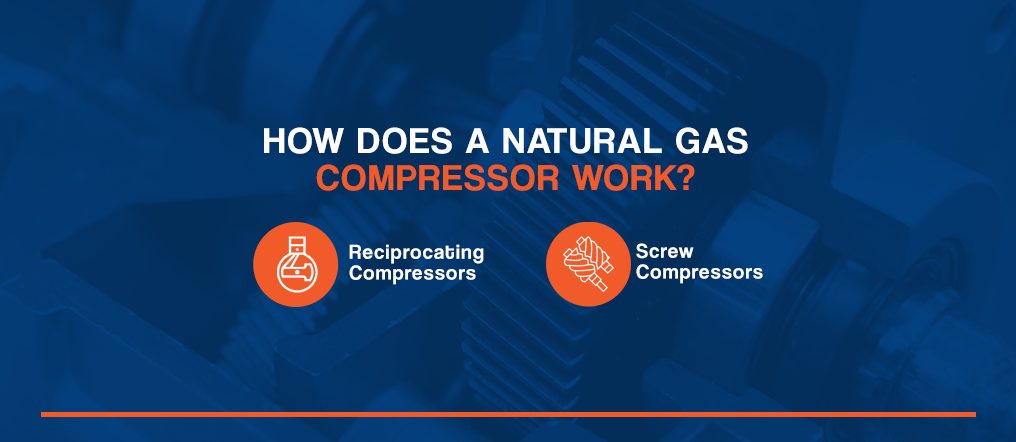
Natural gas compressors are machines that compress natural gas by increasing the pressure and decreasing the volume of the gas. There are several different types of natural gas compressors, and they come in different sizes and are designed for various industries and purposes. Natural gas compressors differ from natural gas air compressors, which are machines that compress air but use natural gas as their fuel source. These compressors also have many commercial and industrial uses. This guide covers everything you should know about both natural gas compressors and natural gas air compressors.
Difference Between Air Compressors and Natural Gas Compressors
First, it’s important to understand the difference between air compressors powered by natural gas and natural gas compressors. These are two different types of machinery used for very different purposes.
Air compressors are devices that convert power or fuel into potential energy in the form of compressed air. These machines can be powered by electricity, natural gas, gasoline, diesel or other fuel sources. Air compressors are used for many applications, including filling air tanks and tires, powering pneumatic tools and more.
On the other hand, natural gas compressors are machines that compress the natural gas itself. The gas is compressed mechanically, in stages, to different pressurization amounts to meet the desired level for delivery. Compressed natural gas is used in various industries for different purposes.

Natural Gas Air Compressors
Air compressors are available in several shapes and sizes and are used in different applications in many industries. Two common types of air compressors use natural gas or electricity as fuel. Natural gas air compressors use natural gas to power the air compression process and are versatile pieces of equipment.
Difference Between Natural Gas and Electric Compressors
Natural gas-powered air compressors and electric air compressors are two of the most popular types of air compressors on the market today, and both have different uses and industries where they are most useful. The main difference comes from the fuel source that powers the air compressor. Electric air compressors are powered by electricity and must be plugged into an electric outlet to work. Natural gas air compressors are powered by natural gas and can be hooked up to a natural gas line or a portable natural gas tank.
Both natural gas air compressors and electric air compressors have some pros and cons, and the best air compressor for your industry or company depends on the type of work you need it for and other factors. Natural gas compressors are generally more versatile and portable and boast higher energy efficiency and lower energy costs. However, they can also be louder to run and give off exhaust that requires proper ventilation.
Electric air compressors can work in just about any setting where there is access to electricity. They are quieter to run and can run continuously without needing to stop and refuel. The downside to electric compressors is that they generally have a higher operating cost due to lower efficiency and the higher cost of electricity. They are also limited by power outages and cannot work if the power goes out, while a natural gas compressor can keep working even during a power outage.
Benefits of Natural Gas Air Compressors
Natural gas air compressors have many benefits over other types of air compressors, including electric air compressors. The benefits of natural gas compressors include:
- Lower energy costs: With electricity costs consistently surging higher, natural gas air compressors are a smart way to save on electricity costs. These air compressors are powered by natural gas, which greatly reduces the electricity needed and, therefore, can save a lot of money for a facility that uses air compressors. Natural gas is a very affordable energy source, and experts predict it will decline in price for the next 15 years.
- Versatile for remote work: With a natural gas air compressor, there’s no need to be constantly attached to an electrical power source, so you can use your air compressor on remote job sites and other areas where finding electricity may be a problem. They can also move across job sites, providing compressed air in different locations without needing to be stationary and plugged in.
- High efficiency: Air compressors powered by natural gas offer a high-efficiency workload, even without a full tank. These compressors are heavy duty and work for various applications.
- Better heat recovery: Many natural gas air compressors can make use of the excess heat recovered from the cooling jacket as well as the gas exhaust. This makes natural gas air compressors much more efficient than other types.
- More environmentally responsible: Natural gas is a very efficient fuel source, produces almost no carbon monoxide and less carbon dioxide than other fuel sources like oil and coal.
- Reduces the risk of sparks: Other types of air compressors are more prone to sparks, which can be incredibly dangerous in certain industries. But natural gas air compressors have a far lower chance of sparking, providing additional safety.
Natural Gas Compressors
Natural gas is a fossil fuel source that formed deep beneath the surface of the earth. Natural gas contains a large amount of methane, as well as other components like hydrocarbon gas liquids, carbon dioxide and water vapor. This natural fuel source was formed millions of years ago from plant and animal matter and is now found in the cracks and spaces between layers of rock, beneath the earth and under the oceans. The natural gas is extracted from these natural stores and sent through a system of pipelines to compress it, store it and eventually transport it to consumers, either in tanks or through direct pipelines.
To make natural gas easier to transport and distribute properly, companies use natural gas compressors to reduce the overall volume of the gas. With compression, the natural gas can move along more easily and in greater quantities. Different types of natural gas compressors may be used at different stages in the pipeline, from extraction to distribution to the end consumer. This is because the gas may lose pressure due to the friction and distance of travel.
Benefits of Natural Gas Compression Services
Natural gas compression services are necessary to safely and effectively extract and transport natural gas to the end consumer, sometimes over very long distances. The main benefits of natural gas compression services include:
- Gas distribution: Once a store of natural gas has been tapped, compression helps the gas flow upwards from the wells and into storage or a distribution network. Additionally, compression used during the transport of natural gas is often considered a lifeline to the distribution system.
- Separation and filtration: An essential component of compression services is the separation and filtration of natural gas. This is necessary to remove any impurities and keep the high quality of the natural gas. Natural gas compressor filters are used at multiple points throughout the natural gas pipeline. As the gas travels, it can collect condensation, which then needs to be filtered out to maintain the purity of the natural gas.
- Maintains consistent pressure: When the natural gas pipelines extend over great distances, different terrain elevations can cause differences in air pressure. Compression services used throughout the pipeline ensure that the natural gas maintains a consistent and safe pressure as it travels. Additionally, these services provide the correct sizing of the pipes to maintain the right pressure while transporting large quantities of natural gas.
Industries That Use Natural Gas
Natural gas has many industrial purposes, from providing an energy source to power machinery to being a main ingredient in manufacturing products like plastics, fertilizers, anti-freeze and fabrics. However, most natural gas is consumed by a small number of industries, including the following:
- Paper and pulp
- Metals
- Chemicals
- Petroleum refining
- Stone, clay and glass
- Plastics
- Food processing
Among these industries, natural gas serves many purposes, including heating, cooling and cooking, just as in residential and commercial uses. It’s also used for treating and incinerating waste matter, preheating metals like steel and iron, drying and dehumidifying, melting glass and fueling industrial boilers. Natural gas can also be separated into various other gases and chemicals for use in manufacturing. Butane, ethane and propane all come from natural gas and can be used for various purposes.
In addition, natural gas is used as a gas desiccant system in which the natural gas serves as a dehumidifying product for industries that manufacture pharmaceuticals, plastics and even candy. The natural gas controls the moisture level in the air and protects the integrity of the products.
Natural gas compression services are important to many industrial uses, including:
- Gas lift
- Reinjection of gas to maintain pressure
- Gas gathering
- Gas processing operations
- Transmission and distribution systems
- Controlling gas volume for shipment and storage
How Does a Natural Gas Compressor Work?
There are two main types of natural gas compressors used for industrial purposes — reciprocating and screw compressors. These two types of natural gas compressors work in different ways to compress the gas.
1. Reciprocating Compressors
A popular choice across many different industries that use compressed natural gas, reciprocating compressors use crankshaft-driven pistons and positive displacement to compress the gas to the correct pressure. There are three main stages in the functioning of the most common types of reciprocating compressors:
- Stage 1: In the first stage of gas compression, the natural gas enters the machine through an inlet and passes through a scrubber where any liquids fall out and can be drained away. Then, the crankshaft-driven pistons push and compress the natural gas, increasing the pressure and temperature of the gas. The gas is then pushed through an intercooler, which helps to cool down the gas again. The heating and cooling processes allow for more condensate to fall out of the gas, so it goes through another scrubber for the liquids to collect.
- Stage 2: In the next stage, the natural gas is again pushed along with another piston to increase the pressure further. This also raises the temperature again, so the gas then goes through the intercooler to drop the temperature lower. And, just as in the first stage, the heating and cooling of the gas cause some more liquids and condensation to fall out in one last scrubber.
- Stage 3: The natural gas goes through one more stage before the compression process is complete. In this stage, the piston again pushes the natural gas to compress it even further and increase the pressure even more. Again, the temperature rises with the increase in pressure, so the gas is pushed through the intercooler one last time. Some industries use an additional scrubber to remove even more condensate, but this is less common.
2. Screw Compressors
Another type of natural gas compressor is a screw compressor. These compressors use a pair of helical screws or rotors, aligned side by side, to spin and compress the gas. The natural gas enters the inlet with suction and moves around the threads of the screws, which compresses the gas as it goes through the machine. The gas is discharged on the other side of the unit at a higher pressure. Screw compressors are generally used in industries and businesses that don’t require as high of gas pressure or as high a volume of gas.
Sizes of Natural Gas Compressors
Natural gas compressors are available in a range of sizes to fit different industrial jobs. Smaller, single-stage compressors are used for lower volumes and pressures of natural gas and may be used to gather vapors and fugitive gases. Medium-sized compressors are often found at wellheads and gathering systems, as well as many other industrial uses. The largest natural gas compressors use several stages and are most often used at compressor stations along a pipeline that transports large quantities of natural gas.
Explore Quincy’s Industry Leading Natural Gas Compressors
Quincy is proud to be one of the nation’s leading natural gas compressor manufacturers, offering a full line of reciprocating style natural gas compressors. Our reciprocating compressors are specially designed for use with natural gas, are easy to maintain and are built to last with heavy-duty cast iron construction. Quincy’s natural gas compressors are of the highest quality, are backed by some of the best warranties in the business and can be used in various industries. You can explore Quincy’s full line of products online or find an authorized Quincy distributor in your area for additional assistance.




